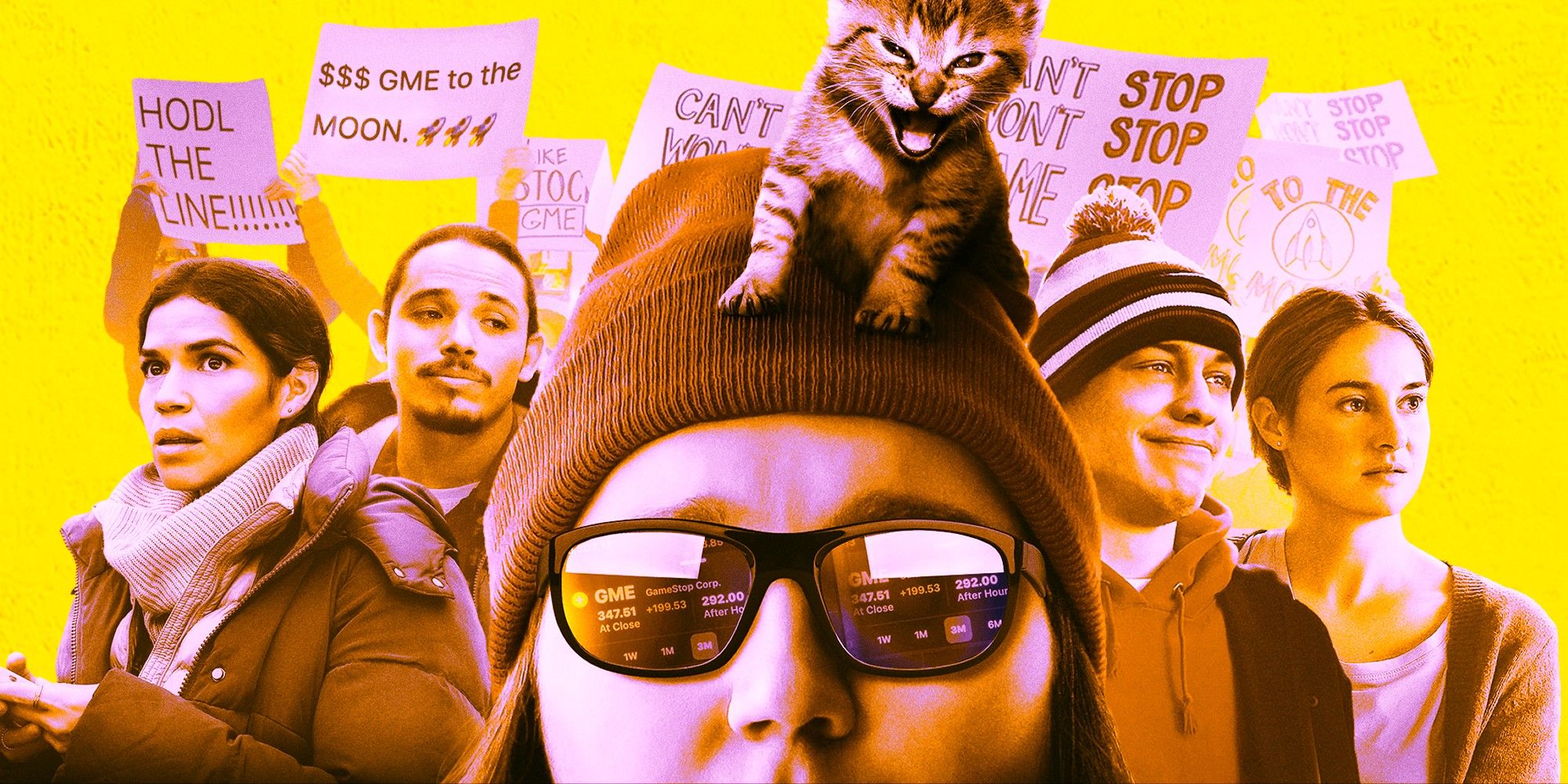Dumb Money brings audiences into the world of stock trading, Wall Street, and Reddit, and the exploration of the GameStop stock story includes plenty of terminology and phrases that could be new to viewers. The 2023 movie tells the true story of how YouTube investor Keith Gill and many others turned GameStop into the hottest stock on the market. They drove the price up and caused billionaires and massive companies to lose billions of dollars by betting against the video game retailer. It is based on the real events that became a major news story in late 2020 and early 2021, but the Dumb Money terminology might still be lost on some.
Unlike some other biographical movies that discuss a world not all audiences are familiar with, Dumb Money‘s true story does not slow down to directly explain to audiences what every term and phrase that is used means. This could leave audiences a bit in the dark about what certain words and sayings mean if they did not closely follow the GameStop stock saga or participate in online stock trading communities, such as on Reddit. That does not stop the characters from repeatedly talking about short squeezes, tendies, hedge funds, and more. Here’s what each of those terms, and more, mean.
Dumb Money’s Investor & Stock Terminology

The entirety of Dumb Money revolves around investors and stocks associated with GameStop, but there are many different types of investors and stocks featured in the movie. Keith Gill (Paul Dano) leads the group of people known as retail investors, which includes Dumb Money cast and characters like Jenny Campbell (America Ferrera), Marcus Barcia (Anthony Ramos), Harmony (Talia Ryder), and Riri (Myha’la Herrold). They are positioned as the heroes of the story, as they oppose hedge fund managers with billions of dollars in net worth such as Gabe Plotkin (Seth Rogen), Steve Cohen (Vincent D’Onofrio), and Ken Griffin (Nick Offerman). Here’s what each of these terms and others mean in Dumb Money.
Retail Investor: The term retail investor refers to anyone who buys and sells stocks for personal investing purposes instead of as part of an organization or group. Sometimes known as individual investors, these people primarily utilize online stock trading to do all their stock trading themselves and buy and sell their stocks in lower volumes due to typically having less money to contribute to the investments. They can often be criticized for not knowing enough about stocks and the companies they are investing in.
Hedge Fund: The term hedge fund refers to a group of private investors whose money and investments are pooled together and handled by a single or multiple managers. Hedge funds typically target wealthy clients due to a high minimum initial investment amount and the possibility of using various tactics to make above-average profits. The term itself comes from the fact that managers often create hedged bets where a portion of the money is invested against the majority to offset any potential losses that happen to key investments.
Net Worth: The term net worth refers to the value of an individual person’s assets after subtracting the cost of any existing liabilities, such as loans, debt, and mortgages. This takes into account the worth of anything a person owns outright compared to what is depleting their revenue. Whereas Ken Griffin has a $16 billion net worth due to his various businesses, someone like Jenny Campbell could have a negative net worth.
Dumb Money: The title of Dumb Money is a term that refers to the collective investments of retail investors. It plays on the idea that retail investors are not smart enough to understand the stock market and the perception that they always lose. That is why hedge fund managers might refer to retail investors as dumb money, whereas they would be considered “smart money.”
Short Selling: The term short selling is used to describe an investment strategy that revolves around betting against a stock to succeed. Investors can borrow shares of a stock and sell it to buyers with the hope that the stock price will be lower than what they sold it for by the time they have to buy the stock back. If the price rises during the short sell, the investor loses money on the deal. This is what many hedge funds did to GameStop’s stock as depicted in Dumb Money.
Short Squeeze: A short squeeze is a rare outcome from short selling that describes an event where the price of a stock with lots of short sells becomes higher instead of lower. The unexpected price change results in short sellers selling their stocks to cut their losses, which only drives up the price of the stock even more. This is what occurred when GameStop’s stock skyrocketed to unprecedented levels for the video game retailer thanks to the growing number of retail investors willing to buy the stock, making it more valuable than hedge funds ever expected.
Dumb Money’s Reddit Phrases & Terminology

One side of the investing in Dumb Money comes through the Reddit community and online investors who became supporters of GameStop’s stock and took Keith Gill’s advice as RoaringKitty. Thanks to the meme culture associated with the Reddit, this is where some unique terminology comes into play in the movie. The community created its own words and phrases to describe different events and positions that stockholders should take over time.
WallStreetsBets: This is the subreddit page that is primarily featured in Dumb Money. r/WallStreetBets was founded in 2012 and has over 14 million active subscribers. The Reddit page is regularly filled with memes and the opinions, questions, and portfolios of retail investors.
Tendies: The abbreviation for chicken tenders takes on a different meaning in the Reddit and retail investors community. Tendies is used to describe the gains or profits someone makes on a stock. It is a celebratory phrase for the Reddit community and why chicken tenders are repeatedly seen or referenced in Dumb Money.
To The Moon: The phrase “to the moon” is used by this community as a way to describe that a stock’s value is going high. It is meant to mean that the stock price is going to keep climbing. A stock going to the moon is represented by a drastic increase in the price on charts. That is why rocket and moon emojis are so commonly used when a stock is doing well, like with GameStop.
Diamond Hands: The term diamond hands refers to the idea that retail investors will not sell their stock. They have diamond hands because of how firmly they will hold onto a stock, even if the price is soaring or falling.
Lions: The cat is used in Dumb Money and online as another way to refer to hedge fund managers, billionaires, or anyone else who is incredibly wealthy and powerful.
Gay Bears: The term is used by many on the Reddit page to describe someone who thinks a stock price is going to fall. It can also be used as a general insult on the page, which is one of many reasons that the Reddit page has been criticized for its conduct in the past.
Dumb Money’s Wall Street Terminology

The other side of the GameStop stock story comes from Wall Street and the bigger avenues for investing. This encompasses everything from the hedge funds to Robinhood for the purposes of Dumb Money‘s story. There are only a few different terms used specifically by these individuals.
Occupy Wall Street: The Occupy Wall Street movement is referenced in Dumb Money, drawing attention to the protest about America’s financial inequality. The movement occurred from September to November 2011 and was meant to raise awareness for a variety of issues, such as corporate influence on politics, bank reform, and student debt forgiveness. It marked the beginning of the wider Occupy Movement. The rise of retail investors was thought to be a way to help level the playing field in the stock market.
Robinhood: Robinhood is the free-to-download stock trading app that played a pivotal role in GameStop’s stock surging. It was founded in 2013 but became much more popular by 2020. Robinhood offers users easy and convenient ways to navigate stocks and is how many retail investors who invested in GameStop’s stock bought the shares.
IPO: The movie makes mention of an IPO, which stands for Initial Public Offering. This is used to refer to the first time that a stock becomes publicly tradable. A company having an IPO must be approved by the Securities and Exchange Commission (SEC).
Stock Order Sale: Stock order sales refer to the process of a company selling stock orders to another company that makes the trade. An example of this depicted in Dumb Money is how Robinhood sells its stock orders to Citadel Securities for a minor fee, and then Citadel is responsible for making the exchange official.




